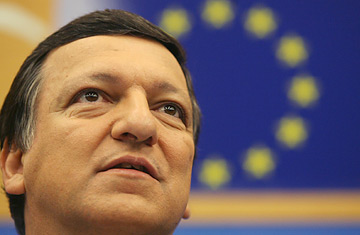
EU Commission Chairman Jose Manuel Barroso.
Former Portuguese Prime Minister José Manuel Barroso is into his fourth year of a five-year term as President of the European Commission. On the eve of the Davos summit — and in the week that the Commission unveiled major new energy and climate-change proposals — he spoke to TIME's Leo Cendrowicz and James Graff.
How vulnerable is Europe's economy to the crisis spreading from the U.S.?
So far, the immediate effects of the turmoil have been largely confined in Europe to the financial sector. The European economy has continued to perform strongly, particularly in job creation. We are confident that knock-on effects should be avoided. We also believe that the dynamism of our emerging economies can mitigate the effects of the slowdown in the United States. There are risks from the subprime crisis but the strong euro has provided a cushion against high energy prices, high commodity prices and the instability of financial institutions. Exports from Germany have been booming. We don't speak here of recession as our American friends do. We are confident, but also vigilant.
What are the European Union's biggest challenges in 2008?
First, we need to implement the Lisbon Treaty [which aims to reform E.U. institutions] so we can concentrate on delivering concrete benefits for citizens. Second is this week's climate-change and energy package. It aims to give Europe sustainable, competitive and secure energy. This is the most important policy for Europe for the 21st century. Some years ago, if the Commission proposed this kind of policy, we would have been accused of entering unauthorized territory. But today, European leaders understand that we should work together.
French President Sarkozy suggests that the E.U. impose an external tariff on countries that aren't working as hard to reduce carbon emissions.
We are not going for an external tariff. We are working for a global agreement. But in case that doesn't work, we should have some mechanisms that do not put our energy-intensive industries at a competitive disadvantage.
Do separate deals with big energy exporters like Russia undermine the E.U.'s efforts toward a common energy policy?
We don't have a completely coherent European policy. But we are not a single country like Russia, the United States or China. More needs to be done if the European Union wants to leverage the weight of our 500 million consumers in 27 countries.
Two and a half years after French and Dutch voters rejected Europe's constitutional treaty, has the E.U. found its confidence again?
We are much, much better now. Opinion surveys are showing the most positive result in over 10 years to the standard question, "Is membership in the European Union a good thing?" The leaders of Europe agreed on a new reform treaty very quickly after those no votes. And, at the same time, we have emphasized a citizens' agenda, a Europe of results, where people can see what the E.U. brings to them — from climate-change issues to cutting mobile-phone roaming charges.
Especially in Britain, some say that not giving the electorate a say on the reform treaty proves that the E.U. is undemocratic. How do you respond?
If you are a democrat, you cannot say that having a vote in a parliament is letting it through the back door.
Are you interested in another term as President of the European Commission?
I like what I'm doing, but it is too soon to say what happens after 2009. I do think the Commission's position will be more important, because most member states see the Commission as an impartial broker. It is the institution that truly represents the E.U.'s common interest, that is fair to all countries, big or small, rich or poor, founding members or newcomers.